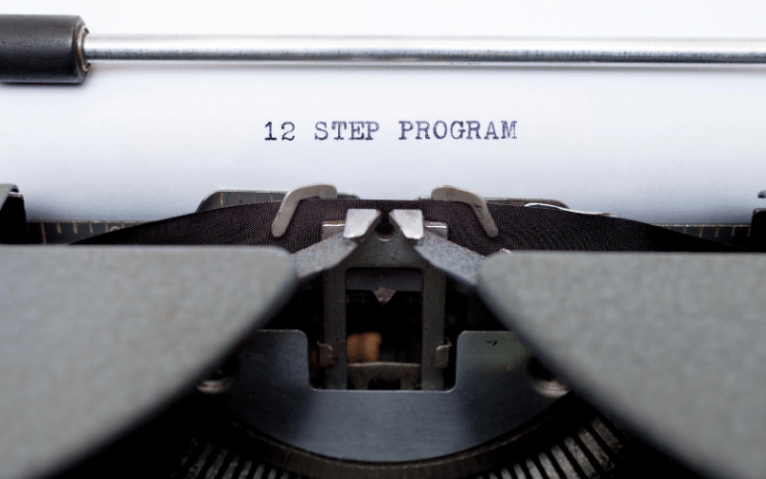Twelve-step programs are just one of the ways addicts maintain sobriety from addiction. People find help through inpatient rehabs, SMART Recovery, Celebrate Recovery, and countless other routes. Let’s find out why therapists suggest 12-step programs to addicts and alcoholics as part of their recovery process.
The History of 12-Step Programs
A twelve-step program is a set of guiding principles that outline a course of action for recovery from addiction, compulsion, and other behavioral problems. In the 1930s, Bill Wilson, author of “The Big Book,” established the first twelve-step program (Alcoholics Anonymous), as a fellowship of men and women looking to get help for their drinking problem. Since then, the same method was adopted by other twelve-step program organizations. Mainly, the process involves:
- Admitting that one cannot control one’s addiction or compulsion
- Believing in a higher power that can give strength
- Examining past errors with the help of a sponsor
- Making amends for those errors
- Learning to live a new life under this new code of behavior
- Helping others who suffer from the same addiction or compulsion
Twelve-step programs can help in the battle against addiction, generally, through the use of their peer support networks. Most addicts report feelings of isolation from their addiction, and meetings helped to overcome those emotions. Thus, twelve-step groups offer support from people who can relate to one another. Also, twelve-step programs provide a variety of tools for self-improvement and connection.
While there’s a myriad of different twelve-step programs out there, the two main ones address the biggest addictions — narcotics and alcohol. One could consider these two programs, the birth of 12-step programs.
Pros & Cons of 12-Step Programs
There’s plenty of anecdotal evidence that supports the benefits of the programs. Some formal research even points out that twelve-step programs can work for many individuals. However, addiction treatment is a very personal journey, and various points of view might be positive or negative.
Pros:
- Programs offer anonymity to allow members to get support without privacy concerns
- No cost access to addiction recovery support
- Access to a broad network of support within the member’s existing community
- The sponsorship method promotes accountability
Cons:
- The model focus on powerlessness might not be effective on everyone
- Most twelve-step programs are not a fit for humanists or atheists
- There’s a lack of emphasis on physical recovery
- The programs are run by recovering addicts, not physicians or therapists, lacking any medical advice
What to Expect During Your First Meeting
Often in meetings of Alcoholics Anonymous, you will hear the phrase, “it works if you work it.” Twelve-step programs involve hard work for those who want recovery. Still, one of the many reasons that people steer clear of these programs is fear.
Often, many fear they will not succeed, while others fear opening up to strangers. Still, others have a concern regarding the spiritual aspect of these programs.
Fortunately, most 12 step programs can ease these concerns. While these programs take work and honesty, they also provide support and understanding. One common factor in all these groups is an authentic human connection. These programs are also completely anonymous, free, and not affiliated with any drug treatment centers.
Meetings are open to anyone with a desire to recover. Hence someone unsure about these programs, attending a meeting to get a feel for it can be a great start. Most 12 step meetings are structured to support newcomers and make them feel welcome.
Many find that even if they are unsure about the 12 steps, the support they find at meetings is an excellent foundation for beginning their recovery journey.
AA Meetings in Delray Beach
Most 12 step groups have a “chip” system.” AA meetings in Delray Beach, Florida, occur hourly. Participants receive different colored chips to celebrate different lengths of recovery. These chips mark outstanding achievements in sobriety.
There is also a white chip for any members who are “surrendering” or starting their recovery path. This ceremony is a way to celebrate and support people at all different places in their journey.
Additionally, outside of meetings, many members help each other stay sober through phone calls and visits. Similarly, some members get together to celebrate birthdays, holidays, and other occasions that aren’t always possible in addiction. These support groups show how 12 step groups enjoy recovery even outside of meetings.
Many people within these programs can experience success, careers, and their families with help from the steps. For anyone struggling with addiction, these groups can be a foundation for a happy, healthy life.
Getting Help
In conclusion, the benefits of 12 step meetings for individuals struggling with drug or alcohol addiction are immense. However, AA is not the only way to get sober. Our Florida drug rehab center provides cutting-edge therapy to address the root cause of addiction.
In addition to supporting the 12-step model, our alcohol treatment center focuses on individualized treatment and evidenced-based concepts. Reach out today and speak with our admission specialists to learn more about our recovery programs.









